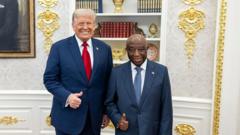Tensions rise as Trump accuses Brazil of undermining US tech and demands an end to Bolsonaro's trial.
Trump’s 50% Tariff Threats and Accusations Against Brazil Spark Tensions

Trump’s 50% Tariff Threats and Accusations Against Brazil Spark Tensions
In his latest escalation, Trump threatens Brazil with hefty tariffs while standing by Bolsonaro.
In a sharp escalation of diplomatic tensions, former US President Donald Trump announced plans to impose a staggering 50% tariff on Brazilian goods, expressing growing dissatisfaction with the nation's stance towards US tech companies and ongoing legal proceedings against former President Jair Bolsonaro. This announcement, shared through a letter on social media, signals a significant increase from the previously established 10% tariff on Brazilian imports.
Trump's recent actions come amid accusations that Brazil has been engaged in a "witch hunt" against Bolsonaro, who is facing prosecution for alleged involvement in an attempted coup following the 2022 presidential election. Brazilian President Luiz Inácio Lula da Silva was quick to respond to Trump's threat, warning that any new tariffs would be met with reciprocation and emphasizing Brazil's autonomy in its legal matters.
As tensions escalated, Trump claimed that the added tariffs were necessary to confront what he described as the injustices perpetrated by the Brazilian government against US interests. In a detailed letter, he signaled plans for a comprehensive investigation into Brazil's digital trade practices, invoking a legal framework typically used to impose tariffs in response to perceived unfair practices. He criticized Brazil for alleged censorship of American social media platforms, a situation complicated by recent rulings from Brazil's Supreme Court regarding accountability of social media companies.
Trump's affinity for Bolsonaro, dubbed the "Trump of the Tropics," was evident as he expressed support for the former president amid his trial, labeling it an "international disgrace." The relationship between the two has been underscored by their shared populist views during their respective presidencies. Both leaders resisted conceding electoral defeats, with Bolsonaro's supporters notorious for storming government buildings shortly after Lula's victory.
The friction between the two nations further highlights broader geopolitical dynamics as Trump continues to threaten tariffs on various countries, all while bolstering his claims against perceived “anti-American” sentiment within groups like BRICS, which includes Brazil. Lula's retort to Trump's threats underscores Brazil's desire for respect and recognition as an independent nation within the changing global landscape.
As the situation evolves, the impact of Trump's tariff threats on US-Brazil relations could reverberate through trade, diplomacy, and economic interactions, compelling both nations to navigate these challenges carefully in the face of mounting international scrutiny.
Trump's recent actions come amid accusations that Brazil has been engaged in a "witch hunt" against Bolsonaro, who is facing prosecution for alleged involvement in an attempted coup following the 2022 presidential election. Brazilian President Luiz Inácio Lula da Silva was quick to respond to Trump's threat, warning that any new tariffs would be met with reciprocation and emphasizing Brazil's autonomy in its legal matters.
As tensions escalated, Trump claimed that the added tariffs were necessary to confront what he described as the injustices perpetrated by the Brazilian government against US interests. In a detailed letter, he signaled plans for a comprehensive investigation into Brazil's digital trade practices, invoking a legal framework typically used to impose tariffs in response to perceived unfair practices. He criticized Brazil for alleged censorship of American social media platforms, a situation complicated by recent rulings from Brazil's Supreme Court regarding accountability of social media companies.
Trump's affinity for Bolsonaro, dubbed the "Trump of the Tropics," was evident as he expressed support for the former president amid his trial, labeling it an "international disgrace." The relationship between the two has been underscored by their shared populist views during their respective presidencies. Both leaders resisted conceding electoral defeats, with Bolsonaro's supporters notorious for storming government buildings shortly after Lula's victory.
The friction between the two nations further highlights broader geopolitical dynamics as Trump continues to threaten tariffs on various countries, all while bolstering his claims against perceived “anti-American” sentiment within groups like BRICS, which includes Brazil. Lula's retort to Trump's threats underscores Brazil's desire for respect and recognition as an independent nation within the changing global landscape.
As the situation evolves, the impact of Trump's tariff threats on US-Brazil relations could reverberate through trade, diplomacy, and economic interactions, compelling both nations to navigate these challenges carefully in the face of mounting international scrutiny.





















